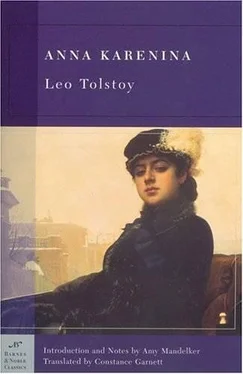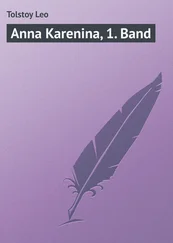Leo Tolstoy - Anna Karenina
Здесь есть возможность читать онлайн «Leo Tolstoy - Anna Karenina» весь текст электронной книги совершенно бесплатно (целиком полную версию без сокращений). В некоторых случаях можно слушать аудио, скачать через торрент в формате fb2 и присутствует краткое содержание. Жанр: Классическая проза, на английском языке. Описание произведения, (предисловие) а так же отзывы посетителей доступны на портале библиотеки ЛибКат.
- Название:Anna Karenina
- Автор:
- Жанр:
- Год:неизвестен
- ISBN:нет данных
- Рейтинг книги:4 / 5. Голосов: 1
-
Избранное:Добавить в избранное
- Отзывы:
-
Ваша оценка:
- 80
- 1
- 2
- 3
- 4
- 5
Anna Karenina: краткое содержание, описание и аннотация
Предлагаем к чтению аннотацию, описание, краткое содержание или предисловие (зависит от того, что написал сам автор книги «Anna Karenina»). Если вы не нашли необходимую информацию о книге — напишите в комментариях, мы постараемся отыскать её.
Anna Karenina — читать онлайн бесплатно полную книгу (весь текст) целиком
Ниже представлен текст книги, разбитый по страницам. Система сохранения места последней прочитанной страницы, позволяет с удобством читать онлайн бесплатно книгу «Anna Karenina», без необходимости каждый раз заново искать на чём Вы остановились. Поставьте закладку, и сможете в любой момент перейти на страницу, на которой закончили чтение.
Интервал:
Закладка:
He was aware of something new in his soul, and joyfully tested this new thing, not yet knowing what it was.
"Not living for his own wants, but for God? For what God? And could one say anything more senseless than what he said? He said that one must not live for one's own wants, that is, that one must not live for what we understand, what we are attracted by, what we desire- but must live for something incomprehensible, for God, whom no one can understand nor even define. What of it? Didn't I understand those senseless words of Fiodor's? And understanding them, did I doubt their truth? Did I think them stupid, obscure, inexact?
"No, I understood him, and exactly as he understands the words. I understood them more fully and clearly than I understand anything in life, and never in my life have I doubted nor can I doubt about them. And not only I, but everyone, the whole world, understands nothing fully but this, and about this only they have no doubt, and are always agreed.
"Fiodor says that Kirillov, the innkeeper, lives for his belly. That's comprehensible and rational. All of us as rational beings can't do anything else but live for our belly. And all of a sudden the same Fiodor says that one mustn't live for one's belly, but must live for truth, for God, and, at a hint, I understand him! And I and millions of men, men who lived ages ago and men living now- peasants, the poor in spirit and the sages, who have thought and written about it, in their obscure words saying the same thing- we are all agreed about this one thing: what we must live for and what is good. I and all men have only one firm, incontestable, clear knowledge, and that knowledge cannot be explained by reason- it is outside it, and has no causes, and can have no effects.
"If goodness has causes, it is not goodness; if it has effects- a reward- it is not goodness either. So goodness is outside the chain of cause and effect.
"And yet I know it, and we all know it.
"And I sought miracles, complained that I did not see a miracle which would convince me. And here is a miracle, the sole miracle possible, continually existing, surrounding me on all sides, and I never noticed it!
"What could be a greater miracle than that?
"Can I have found the solution of it all? Can my sufferings be over?" thought Levin, striding along the dusty road, not noticing the heat nor his weariness, and experiencing a sense of relief from prolonged suffering. This feeling was so delicious that it seemed to him incredible. He was breathless with emotion and incapable of going farther; he turned off the road into the forest and lay down in the shade of an aspen on the uncut grass. He took his hat off his hot head and lay propped on his elbow in the lush, feathery, woodland grass.
"Yes, I must make it clear to myself and understand," he thought, looking intently at the untrampled grass before him, and following the movements of a green beetle, advancing along a blade of couch grass and lifting up in its progress a leaf of goatweed. "Everything from beginning?" he asked himself, bending aside the leaf of goatweed out of the beetle's way and twisting another blade of grass above for the beetle to cross over to. "What is it makes me glad? What have I discovered?
"Of old I used to say that in my body, that in the body of this grass and of this beetle (there, she didn't care for the grass, she's opened her wings and flown away), there was going on a transformation of matter in accordance with physical, chemical, and physiological laws. And in all of us, as well as in the aspens and clouds and nebulae, there was a process of evolution. Evolution from what? Into what?- Eternal evolution and struggle… As though there could be any sort of tendency and struggle in the eternal! And I was astonished that in spite of utmost effort of thought in this direction I could not discover the meaning of life, the meaning of my impulses and yearnings. And the meaning of my impulses is so clear within me, that I was living according to them all the time, and I was astonished and rejoiced, when the peasant expressed it to me: to live for God, for my soul.
"I have discovered nothing. I have only found out what I knew. I understand the force that in the past gave me life, and now too gives me life. I have been set free from falsity, I have found the Master."
And he briefly went through, mentally, the whole course of his ideas during the last two years, the beginning of which was the clear confronting of death at the sight of his dear brother hopelessly ill.
Then, for the first time, grasping that for every man, and himself too, there was nothing in store but suffering, death and eternal oblivion, he had made up his mind that life was impossible like that, and that he must either interpret life so that it would not present itself to him as the evil jest of some devil, or else shoot himself.
But he had not done either, but had gone on living, thinking, and feeling, and had even at that very time married, and had had many joys, and had been happy, when he was not thinking of the meaning of his life.
What did this mean? It meant that he had been living rightly, but thinking wrongly.
He had lived (without being aware of it) on those spiritual truths that he had sucked in with his mother's milk, but he had thought, not merely without recognition of these truths, but studiously ignoring them.
Now it was clear to him that he could live only by virtue of the beliefs in which he had been brought up.
"What should I have been, and how should I have spent my life, if I had not had these beliefs, if I had not known that I must live for God and not for my own wants? I should have robbed and lied and killed. Nothing of what makes the chief happiness of my life would have existed for me." And with the utmost stretch of imagination he could not conceive the brutal creature he would have been himself, if he had not known what he was living for.
"I looked for an answer to my question. And thought could not give an answer to my question- it is incommensurable with my question. The answer has been given me by life itself, in my knowledge of what is right and what is wrong. And that knowledge I did not arrive at in any way, it was given to me as to all men, given, because I could not have got it from anywhere.
"Where could I have got it? Could I have arrived through reason at knowing that I must love my neighbor and not oppress him? I was told that in my childhood, and I believed it gladly, for they told me what was already in my soul. But who discovered it? Not reason. Reason discovered the struggle for existence, and the law that requires us to oppress all who hinder the satisfaction of our desires. That is the deduction of reason. But loving one's neighbor reason could never discover, because that is unreasonable.
"Yes, pride," he said to himself, turning over on his abdomen and beginning to tie a noose of blades of grass, trying not to break them.
"And not merely pride of intellect, but dullness of intellect. And most of all, its knavishness; yes, the knavishness of intellect. The cheating knavishness of intellect- that's it," he repeated.
XIII
And Levin remembered a scene he had lately witnessed between Dolly and her children. The children, left to themselves, had begun cooking raspberries over the candles and squirting milk into each other's mouths with a syringe. Their mother, catching them at these pranks, began reminding them in Levin's presence of the trouble their mischief gave to the grown-up people, and that this trouble was all for their sake, and that if they smashed the cups they would have nothing to drink their tea out of, and that if they wasted the milk, they would have nothing to eat, and die of hunger.
And Levin had been struck by the passive, weary incredulity with which the children heard what their mother said to them. They were simply annoyed that their amusing play had been interrupted, and did not believe a word of what their mother was saying. They could not believe it indeed, for they could not take in the immensity of all they habitually enjoyed, and so could not conceive that what they were destroying was the very thing they lived by.
Читать дальшеИнтервал:
Закладка:
Похожие книги на «Anna Karenina»
Представляем Вашему вниманию похожие книги на «Anna Karenina» списком для выбора. Мы отобрали схожую по названию и смыслу литературу в надежде предоставить читателям больше вариантов отыскать новые, интересные, ещё непрочитанные произведения.
Обсуждение, отзывы о книге «Anna Karenina» и просто собственные мнения читателей. Оставьте ваши комментарии, напишите, что Вы думаете о произведении, его смысле или главных героях. Укажите что конкретно понравилось, а что нет, и почему Вы так считаете.












